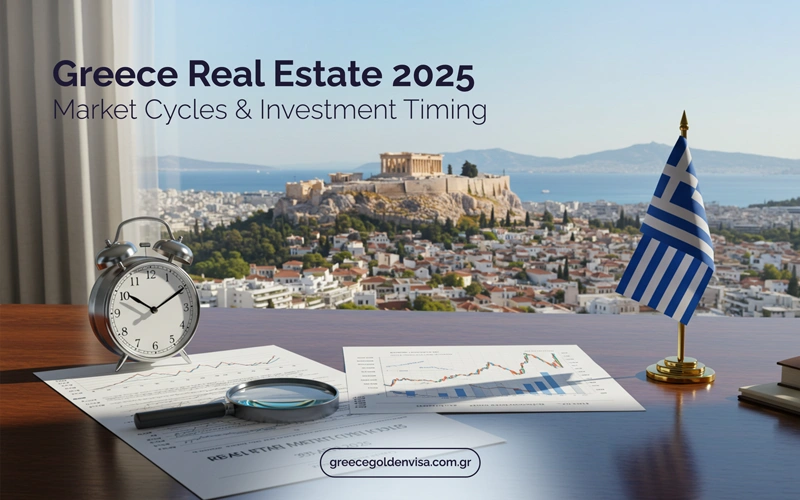As of August 7, 2025, the most frequent question we receive from sophisticated investors is not “what property should I buy?” but rather, “Is now a good time to invest in Greek real estate?” The answer to this critical question is not a simple yes or no. It lies in a deeper understanding of economic cycles—the natural, recurring phases of expansion and contraction that define every property market.
For the strategic investor, timing is not about predicting the bottom or the top, but about understanding the current phase of the cycle and deploying capital accordingly.
This guide provides a definitive framework for analyzing the Greek real estate market cycle in 2025. We will move beyond simple price trends to apply a classic four-phase model, diagnosing where the Greek market currently stands and what that means for your investment strategy.
We will analyze the key macroeconomic drivers shaping the landscape and outline how to find value in a market that has moved from early recovery into a phase of mature expansion. This is your guide to making an informed, confident, and timely investment in your Greek Golden Visa asset.
The Strategic Investor’s Brief: 2025 Market Snapshot
- Current Market Phase: Mature Expansion. The period of rapid, broad-based price recovery from the crisis lows is over. The market is now characterized by stable growth, driven by strong fundamentals rather than speculation.
- Primary Drivers: A “super-cycle” in tourism, sustained Foreign Direct Investment (FDI) amplified by the Golden Visa program, and major infrastructure projects.
- Key Headwind: The global interest rate environment and broader economic conditions in Europe and worldwide, which could moderate the pace of growth.
- Strategic Focus for 2025: A “flight to quality.” Success now depends on acquiring high-quality, unique assets in prime locations or identifying specific “value-add” opportunities, rather than relying on the entire market to lift all boats.
The Classic Real Estate Cycle: A Framework for Analysis
All property markets move through a predictable, four-phase cycle. Understanding this framework is essential for strategic timing.
- Phase 1: Recovery: The cycle’s trough. Prices are low, occupancy is down, and construction is stagnant. This is the phase of maximum opportunity for high-risk, high-reward investors.
- Phase 2: Expansion: A period of rising demand, increasing rents, falling vacancies, and new construction beginning. This is the growth phase where most investors enter the market.
- Phase 3: Hyper-supply: New construction from the expansion phase begins to outpace demand. Vacancy rates start to creep up, and rent growth flattens or declines.
- Phase 4: Recession: The market contracts. Prices and rents fall, and the market seeks a new bottom before the recovery phase can begin again.
Where is the Greek Real Estate Market in 2025? A Cyclical Diagnosis
The National Picture: A Mature Expansion Phase
After a decade-long recovery from its post-2009 trough, the Greek real estate market as a whole is firmly in a mature expansion phase. The key characteristics are visible:
- Price Growth: Prices are still rising, but the rate of growth is moderating from the explosive double-digit increases seen in earlier years.
- Construction Activity: New construction is robust, particularly in prime residential and commercial sectors.
- Strong Fundamentals: Demand is supported by tangible factors (tourism, investment) rather than speculative fervor.
Sub-Market Analysis: Differentiated Cycles
It is crucial to recognize that “Greece” is not one single market. Different regions are at different points in their cycle.
- Prime Athens & Cyclades (Mykonos, Santorini): These markets are the most advanced in the expansion cycle. They have seen the most significant price appreciation and are attracting the lion’s share of high-end investment. The strategy here should be highly selective, focusing on truly unique, premium properties that can hold their value even if the market flattens.
- Developing Regions & Urban Regeneration Zones: Areas outside the absolute prime core—such as certain parts of the Peloponnese, other Cycladic islands, or urban regeneration projects in Piraeus—are in an early-to-mid expansion phase. These areas may offer greater potential for capital appreciation over the next 5-10 years but come with a higher risk profile.
Key Macroeconomic Drivers Shaping the Market in 2025
Driver 1: The Tourism Super-Cycle
Tourism is the lifeblood of the Greek economy and a primary driver of real estate demand, particularly for short-term rentals. The continued strength of this sector supports property values in coastal and island locations.
Driver 2: Foreign Direct Investment & The Golden Visa Effect
Greece continues to attract significant foreign investment. The Golden Visa program, especially with its new higher tiers, channels hundreds of millions of Euros into the property market annually. This creates a strong and consistent source of demand, particularly in the €400,000+ price brackets.
Driver 3: The Global Interest Rate Environment
While most Golden Visa purchases are made with cash, the higher global interest rate environment affects the broader market. It makes borrowing more expensive for local buyers and developers, which can act as a natural brake on price inflation and construction, potentially preventing a move into “hyper-supply.”
Strategic Investment Timing: From “When” to “Where and What”
In a mature expansion market, the question of “when” becomes less important than “where and what.” The strategy shifts from buying anything to buying the right thing.
Strategy 1: “Flight to Quality” in Prime Markets
In an environment of moderating growth, well-located, high-quality, and unique properties tend to outperform the general market. For the Golden Visa investor, this means focusing on the €800,000 tier in the Athens Riviera or a Cycladic island is not just about meeting a requirement; it is a sound defensive strategy to acquire an asset that will hold its value through all phases of the cycle.
Strategy 2: Identifying “Value-Add” Opportunities
The other key strategy is to create your own value rather than buying it. This involves identifying well-located but unmodernized properties and investing in a high-quality renovation. By transforming a dated apartment into a modern luxury residence, you can achieve a significant uplift in value that is independent of the broader market’s movement.
The Path Forward: Investing with Cyclical Awareness
The window to “buy the dip” in the Greek real estate market closed several years ago. However, the current mature expansion phase in 2025 offers compelling opportunities for the strategic investor who understands the market’s dynamics. By focusing on quality, income potential, and value-add opportunities, you can make a secure and profitable investment that will not only grant you a Golden Visa but will also serve as a cornerstone of your international property portfolio for years to come.
To receive a detailed analysis of specific sub-markets and identify assets that are well-positioned in the current cycle, we invite you to schedule a private consultation with our investment strategy team.
The Real Estate Investor’s Frequently Asked Questions (FAQs)
- Have I “missed the boat” on the Greek property market?
- No. You have missed the bottom of the market, which was a period of high risk. You are now entering a more stable, mature market with proven fundamentals. The opportunity has shifted from speculative recovery to strategic, quality-focused investment.
- How would a potential global recession affect the Greek real estate market?
- A global recession would likely impact the tourism sector, which would, in turn, affect the short-term rental market and could slow the rate of price appreciation. However, prime, well-located properties have historically proven to be more resilient during downturns than secondary assets.
- Where are the next “up-and-coming” areas in Greece for property investment?
- While Athens and the famous islands are mature markets, areas that are benefiting from new infrastructure, such as the Peloponnese peninsula, and less-developed islands in the Ionian and Cycladic groups are attracting increasing interest. These offer higher growth potential but require more thorough due diligence.
- How does the rental market perform during different cycle phases?
- In the expansion phase, rents rise robustly. In a mature expansion phase, rent growth tends to slow but remains positive. In a hyper-supply or recession phase, rents can stagnate or fall. A key strategy is to own a property whose quality and location command premium rents even in a softer market.
- Are there any signs of a real estate “bubble” in Athens or Mykonos?
- As of 2025, while prices have risen significantly, most economists do not consider the market to be in a “bubble.” This is because the price growth has been driven by a genuine recovery from extremely low levels and is supported by strong fundamental demand from tourism and foreign investment, rather than by excessive, speculative local borrowing, which is the typical hallmark of a bubble.
 Greece — +30 698 557 8998
Greece — +30 698 557 8998
 Turkey — +90 506 022 30 00
Turkey — +90 506 022 30 00
 UAE — +971 52 913 5599
UAE — +971 52 913 5599
 Egypt — +20 110 114 9411
Egypt — +20 110 114 9411





